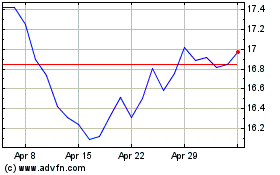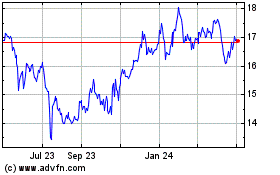Roku Signs Deal to Carry HBO Max, Ending Standoff -- Update
December 16 2020 - 5:24PM
Dow Jones News
By Patience Haggin
Roku Inc. reached a deal with AT&T Inc.'s WarnerMedia to
carry the HBO Max streaming service on Wednesday, ending an eight
month standoff between the companies and ensuring that Roku
customers will be able to watch content such as the upcoming
"Wonder Woman" movie.
The two companies were at loggerheads since HBO Max was launched
in May over the financial terms for Roku to carry the app. The
stakes were raised for both sides when WarnerMedia said the highly
anticipated movie "Wonder Woman 1984" would be released
simultaneously in theaters and on HBO Max on Christmas Day.
The agreement significantly expands the potential audience for
the WarnerMedia movie. Roku is the leading streaming app
distributor in the U.S., with some 46 million active accounts and
38% of the market including set-top devices and software that
powers smart TVs.
Spokesmen for both companies declined to comment on the terms of
the deal.
WarnerMedia has said its full slate of films for 2021 will be
launched the same way as "Wonder Woman," with availability on HBO
Max in the U.S. alongside the theatrical release. The company hopes
that such premium programming will generate a wave of subscriptions
for the streaming service, which is battling Netflix Inc., Walt
Disney Co.'s Disney+, Comcast Corp.'s Peacock, and several other
services.
The standoff with HBO Max is one of several Roku has had with
media companies. Its biggest rival in streaming-media distribution,
Amazon.com Inc., also has had tense negotiations with some
companies over carrying their apps in its FireTV devices.
WarnerMedia reached a deal to place HBO Max on FireTV in
November.
Roku makes money selling its devices, but also generates
substantial revenue through its deals with content providers. When
companies get their apps carried by Roku, they generally agree to
supply a share of subscription revenue and advertising space.
WarnerMedia and Roku differed over how to split ad space in an
upcoming ad-supported version of HBO Max, people familiar with the
talks said. WarnerMedia took a hard line in the talks against
supplying content to The Roku Channel, an ad-supported video app
owned by Roku, one of the people said.
It is unclear how the two sides resolved those conflicts. A Roku
spokesman declined to say whether WarnerMedia shared any content
for the Roku Channel.
Standoffs such as the one between HBO Max and WarnerMedia are
becoming a regular occurrence in TV's streaming era. They are
reminiscent of negotiations in the cable-TV world, when
distributors pay carriage fees to networks. For years, cable
channels and providers have quarreled over those terms, sometimes
leaving cable customers without access to programming.
Roku had a similar dispute with Fox Corp. over carriage of its
apps that nearly left Roku users without access to the Feb. 2 Super
Bowl. A long standoff with Comcast Corp.'s NBCUniversal over
carrying Peacock nearly pushed Roku to drop dozens of NBCUniversal
apps from its channel store in September. This month Roku blocked
new downloads of Spectrum, an app for customers of Charter
Communications Inc., after a carriage contract between the two
companies expired.
Write to Patience Haggin at patience.haggin@wsj.com
(END) Dow Jones Newswires
December 16, 2020 17:09 ET (22:09 GMT)
Copyright (c) 2020 Dow Jones & Company, Inc.
AT&T (NYSE:T)
Historical Stock Chart
From Mar 2024 to Apr 2024

AT&T (NYSE:T)
Historical Stock Chart
From Apr 2023 to Apr 2024
